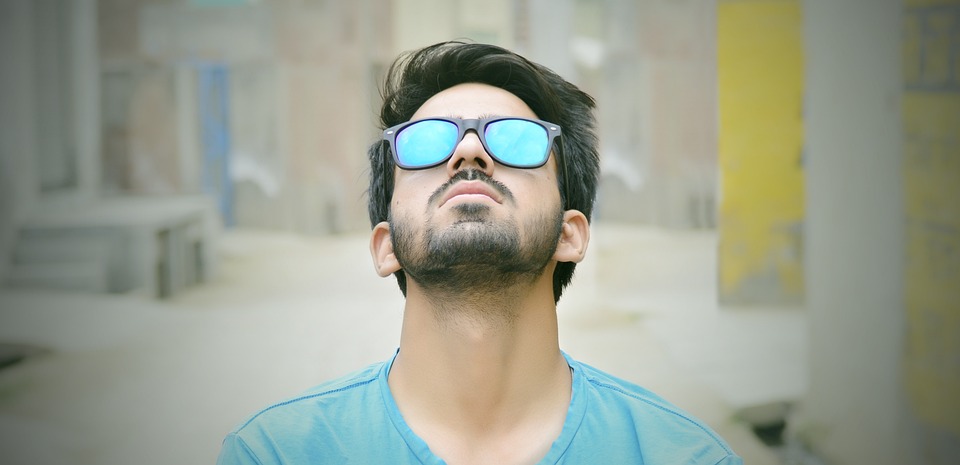
If the Sun is not impacting my eyes, still is it necessary to wear sunglasses?
Yes, you should wear sunglasses even when the Sun is not bothering your eyes because the Sun emits the dangerous ultraviolet (UV) rays that can damage your eyes never or ever.
What are ultraviolet rays and their types?
Ultraviolet (UV) rays are high-energy and invisible light rays that are emitted by the Sun. They are categorized in the following types based on their intensity.
1. UVA: They have a longer wavelength and the ability to pass through the glasses easily. But it is not proved if UVA damages the eyes or not.
2. UVB: They are very harmful rays that can damage your eyes. They cannot pass through the glasses. So, wearing sunglasses is a must for eye protection.
3. UVC: These rays are blocked by the earth’s Ozon layer before reaching the surface. So, we are safe naturally.
When do UV rays harm my eyes?
Sun rays are on their peak between 10 a.m. and 2 p.m. They are more harmful to the eyes at that time frame. But at other times they are also harmful.
Glare and reflections from snow, water, or sand can trouble your eyes. So, it is good to wear sunglasses when you are near them.
Some other sources of UV radiation that can damage your eyes are Sunlamps, tanning beds, photosensitizing drugs, high altitudes, and proximity to the equator.
Can existing medical problems can increase the risk of eye damage from UV rays?
Yes, if you have had cataract surgery before, macular degeneration, or retinal dystrophies. You need to be extra careful.
How can I prevent UV rays from damaging my eyes?
The best solution to this is wearing sunglasses that have the ability to block 100% of UV rays. Some contact lenses also provide protection from UV rays but they don't cover your whole eye. You must select the wraparound sunglasses to block harmful UV rays from entering around the frame.
How many types of sunglass lenses are available?
There is plenty of sunglass lenses available in the market but you should consult with your eye doctor while choosing sunglasses. Their advice will help you to select the sunglass tints that are best suited for your needs. Here are some sunglass lenses that you may consider:
1. Sunglasses with polarised lenses: Polarised lenses reduce glare from bright light reflecting off flat surfaces that provide greater comfort to eyes.
2. Sunglasses with anti-reflective coating: Anti-reflective (AR) coating applied to the backside of the lenses also reduce glare that prevents light from reflecting off the back surface of your sunglasses.
3. Sunglasses with mirror-coated lenses: Mirror-coated lenses make your eyes feeling comfortable by reducing the light entering your eyes. They are beneficial for activities in very bright conditions, such as snow skiing on a sunny day.
4. Sunglasses with Gradient lenses: The top of the lens is darkest because gradient lenses are tinted from the top down. The sunglasses are perfect for driving because they shield your eyes from overhead sunlight.
5. Sunglasses with photochromic lenses: Photochromic lenses have the ability to adjust their level of darkness according to the amount of UV light they're exposed to. So, they can protect your eyes.
6. Multifocal sunglasses: These sunglasses can be made with progressive lenses perfect for people of the age of 40+ and suffering from presbyopia.
Which lens color is best?
Although lens color doesn’t matter when it comes to protecting your eyes from UV light. Choosing the lens color is a personal choice of everyone. Gray and brown are popular due to their least color perception distortion property.
Do darker lenses provide more UV protection?
Nothing is like that. Darker sunglasses lens reduces the amount of visible light that passes through the lenses compared with lighter lens tints. The only thing that matters, sunglasses should block 100 % UV light.
Do sunglasses are necessary for children?
Of course, children's sunglasses are essential. Their eyes are more sensitive than adults. UV rays can damage the eyes for a lifetime. So, it is important to start protecting your child's eyes as soon as possible.
Stefan Elie is the owner of an eyeglass repair shop in the USA. He loves writing about his experiences.

Post new comment
Please Register or Login to post new comment.